INFORMED DISSENT
NOW is the time for everyone around the world to stand up in support of our fundamental and unalienable rights to bodily autonomy, informed consent and INFORMED DISSENT.
SHARE THIS LINK: http://Informed-Dissent.com
To all my readers…
Over a month ago, I published a request for “volunteers” to participate in an absolutely enormous project. Since then, I have had hundreds of conversations with people around the world regarding the concept of…
“Out of the WHO and in with the NEW!”
I have been, and will continue to be, very active in my opposition to the World Health Organization. However, in my humble opinion, the proposed amendments and the “Pandemic Agreement” that I have been focused on for the past two years are actually just symptoms that are caused by much deeper problems.
I believe that the issues of bodily autonomy, informed dissent and a lack of government transparency and accountability are actually more important than the WHO negotiations.
The purpose of this article is to coordinate a group effort to write model legislation to address the deficiencies in the law that contributed to the problems of the past four years.
Please watch the 2.5 minute video below…
CLICK HERE TO REVIEW THE RESEARCH TOWARD THE DEVELOPMENT OF MODEL LEGISLATION
CLICK HERE TO LEARN ABOUT THE EUROPEAN CITIZENS’ INITIATIVE
CLICK HERE TO REVIEW THE HEALTH FREEDOM BILL OF RIGHTS
Please watch the video below…
CLICK HERE TO SIGN THE EUROPEAN CITIZENS’ INITIATIVE
FOUR QUESTIONS:
Have you ever actually seen the section of the criminal code that imposes a fine or penalty of imprisonment for a violation of informed consent in regards to clinical trial activity?
Have you ever actually seen the section of the criminal code that imposes a fine or penalty of imprisonment for a violation of informed consent in regards to normal medical practice?
If there is no law that imposes a fine or penalty for violating the obligation to provide proper information and ensure clear comprehension prior to medical therapy, isn't the lack of such a law the real reason why our rights have been violated with impunity?
ARE YOU WILLING TO WORK WITH ME TO WRITE AND ENACT LEGISLATION around the world to ensure that our fundamental unalienable right to bodily autonomy can never again be violated, even during a so-called emergency?
ARE YOU WILLING TO STAND IN SUPPORT OF THE FOLLOWING STATEMENTS?
Everyone has the fundamental and unalienable right to bodily autonomy.
EVERYONE ALWAYS HAS THE RIGHT TO REFUSE TREATMENT OF ANY KIND. Informed dissent means that everyone has the right to refuse or withdraw consent at any point in their health journey without facing unwarranted pressure or coercion. Health care providers MUST respect and honor people’s decisions.
Informed consent means that everyone has the right to make fully informed decisions regarding their health care and treatment options for themselves and their children.
Everyone must be provided with COMPLETE, accurate and diverse information about their medical condition, available treatments, and the potential risks and benefits of any such treatment.
Everyone must fully comprehend the nature, purpose, risks, and potential benefits of medical procedures and/or treatments in order to be able to make well-informed decisions.
Everyone must also be fully informed and comprehend the nature, purpose, risks, and potential benefits of OTHER (non-medical) procedures and/or treatments in order to be able to make well-informed decisions.
Informed consent REQUIRES freedom from any form of pressure, incentive, coercion or threat.
Everyone’s fundamental and unalienable rights must always be respected, even when some government official claims that there is an “emergency.”
These fundamental, unalienable rights cannot be suspended for any reason whatsoever.
Clearly written laws must be enacted worldwide to detail punishment for those who are convicted of violating people’s fundamental right to bodily autonomy, informed consent and informed dissent.
Regardless of where you may live, the issues above are at the core of our problems.
If you are willing to stand up in support of the concept of bodily autonomy for all people, in all circumstances, at all times, in every nation on the planet, then I invite you contact me directly:
James Roguski +1 310-619-3055 (Phone, text, Signal, WhatsApp or Telegram) Skype: james.roguski
PLEASE watch the recordings of our previous Zoom meetings and read through the detailed definition of informed consent below, before you attend our daily zoom meeting.
CLICK HERE TO SIGN THE EUROPEAN CITIZENS’ INITIATIVE
CLICK HERE FOR DETAILS REGARDING THE EUROPEAN CITIZENS' INITIATIVE DAILY ZOOM MEETING
INFORMED CONSENT IS A CONVERSATION, NOT A FORM
Physicians and other medical providers have a responsibility to obtain legally sufficient informed consent from people. A provider who fails to obtain adequate informed consent MUST face civil liability and professional AND LEGAL CONSEQUENCES.
A patient’s right to be informed of the risks of treatment might be compared to a criminal defendant’s Miranda rights: “You have the right to remain silent” - “YOU ALWAYS HAVE THE RIGHT TO REFUSE TREATMENT.”
When a physician or other healthcare professional fails to obtain proper informed consent before proceeding with treatment, and harm is caused, people can file a lawsuit (also called a civil action) against that provider.
HOWEVER, this is NOT adequate. Criminal penalties must be defined and/or strengthened in order to provide a strong disincentive to end the ongoing violations of fundamental rights and freedoms by the medical establishment.
PHYSICAL HARM DOES NOT NEED TO HAPPEN FOR A PUNISHABLE VIOLATION OF RIGHTS TO HAVE OCCURRED.
THE CRIMINAL ACT (OF FAILURE TO OBTAIN PROPER INFORMED CONSENT) AND THE PENALTIES ASSOCIATED WITH SUCH A CRIME NEED TO BE CLEARLY DEFINED IN THE LAW.
The doctrine of informed consent requires healthcare providers to inform people of the risks, benefits, and alternatives of a proposed treatment.
IT ALSO REQUIRES THEM TO INFORM PEOPLE OF OTHER OPTIONS.
Legally, people must have firsthand knowledge of their treatment options and the likely consequences of those choices, which allows them to make an informed choice.
People’s fundamental and unalienable right to refuse proposed treatments for any and all reasons, MUST BE HONORED IN ALL CIRCUMSTANCES.
Informed consent REQUIRES physicians and other providers who propose medical treatments or procedures to first discuss the potential risks, benefits, and alternatives of that treatment with the patient.
This discussion between a patient and provider should allow ample opportunities for questions, and the patient should demonstrate a clear understanding of the path forward. The patient must have an opportunity to ask questions, and this conversation must be thoroughly documented.
Ultimately, the provider must ensure that the patient has made an informed decision to proceed with (or decline) further treatment. Special considerations also apply for minor child patients and dependents.
When the patient is a minor or a dependent adult, the patient’s legal guardian or parent typically provides informed consent on their behalf. Depending upon the diagnosis and treatment, the minor or dependent patient’s consent may also be required.
Only after the patient’s physician has explained the risks, benefits, and alternatives of each treatment option can the patient make an informed treatment decision and provide legally sufficient informed consent.
SOURCE:
https://jacksonllp.com/informedconsent-lawsuits/
https://jacksonllp.com/informed-consent/
Informed Consent
The specific LEGAL definition of informed consent may vary from state to state.
At its core, informed consent means that a patient must understand and agree to a procedure or test before treatment. A healthcare provider must inform the patient of the following:
The patient's diagnosis (if known) and prognosis
The nature and purpose of the proposed treatment or procedure
The benefits and risks of that proposed treatment or procedure
The alternatives to the proposed treatment or procedure
The alternative treatment options
The risks and benefits of alternative treatments or procedures
The risks and benefits of not receiving or undergoing any treatment or procedure
Clarity regarding the patient's right to refuse treatment
Whether the patient's health insurance covers the treatment
An explanation of the consent document
The patient, or the patient's authorized representative, must sign and date the informed consent form
The patient or their authorized representative must receive a copy of the informed consent
The patient must have an opportunity to understand the treatment or procedure, ask questions, and/or refuse treatment. Asking questions helps a patient make an informed decision. Once a patient understands the benefits and risks of the procedure, the healthcare provider MUST get the patient's written consent.
The patient must have decision-making capacity. This means there are no language or intellectual barriers. A certified medical translator must translate if a patient speaks a different language, or the informed consent form should be provided in multiple languages. If the patient has a legal guardian, the guardian handles informed consent. They are responsible for understanding the procedure, risks, and side effects before deciding, and can sign on behalf of the patient.
A physician must disclose information to the patient so they can make a reasonable decision about treatment. Most patients' bill of rights includes informed consent.
Once signed and dated, the form MUST be entered into the patient's permanent medical record.
Informed consent must be freely given, free from coercion or improper influence, and the patient has to have the ability to comprehend the information presented and get a choice to be regarded as legitimate. The healthcare professional additionally has to guarantee that the information provided is presented in a clear and easy manner and allows the patient to get a chance to ask questions and get further information as needed.
What Are Some Important Informed Consent Laws?
Depending on the country and the kind of medical procedure or intervention being considered, different countries may have different informed consent laws. Here are some significant informed consent laws:
Capacity: Patients must be able to make choices regarding their own healthcare. The term “capacity” refers to a patient’s ability to comprehend the information given, grasp the effects of their choice, and convey that choice to medical professionals.
Disclosure: Healthcare professionals are required to give patients all pertinent information regarding their treatment, including the advantages and disadvantages of any potential interventions or treatments as well as any available alternatives.
Voluntariness: Patients should not be subjected to pressure or undue influence from healthcare professionals or other parties while making decisions regarding their medical care.
Documentation: Healthcare professionals are required to record the informed consent process, such as the information given to the patient, their decision, and any modifications to the suggested course of action.
Why Is Informed Consent So Important?
As it upholds a patient’s autonomy, rights, and dignity, informed consent is crucial in the healthcare industry. It enables patients to decide on their own values, choices, and needs for medical care in an informed manner. Furthermore, informed consent:
Enhances patient security: Patients are better equipped to make decisions that are in their best interests and can prevent needless medical issues when they are informed about the risks and advantages of their medical care.
Builds trust: Patients develop trust and respect for healthcare professionals who take the time to clarify medical treatments and procedures to them and acquire their informed permission.
Supports moral behavior: A dedication to providing patient-centered care, informed consent is the foundation of ethical practice in healthcare.
What Are The Possible Consequences Of Treating A Patient Without Consent?
When failure to obtain informed consent happens, a patient can prosecute the doctor with a civil offense such as gross negligence and/or an illegal act. Charges may be brought for battery or willful disregard.
In a civil complaint, the patient would have to establish two aspects and medical treatment might be prohibited if the doctor didn’t completely explain either the process or the hazards associated with the surgery. These two things are: the patient must demonstrate that the procedure or treatment was carried out without their informed permission and that, had they been aware of the procedure’s hazards, they would have declined to have it done and avoided the harm.
Is It Illegal To Not Have Informed Consent?
Giving medical care without the patient’s or their legal representative’s informed permission is prohibited in several nations. Healthcare practitioners must seek informed consent before performing any medical treatment or intervention, while the particular rules and regulations governing informed consent may differ depending on the country. A healthcare provider or institution may be held legally liable for failing to get informed consent, and they may also face disciplinary action from regulatory agencies or professional associations.
The goal of informed consent is to safeguard patients’ autonomy and well-being. It is regarded as a fundamental patient right and a duty of care for healthcare professionals. It is crucial for healthcare practitioners to seek informed consent from their patients in order to guarantee that they are giving patient-centered care that respects the values, interests, and needs of each and every patient.
https://www.halt.org/consequences-of-failure-to-obtain-informed-consent/
RESOURCES:
How informed is the informed consent?
https://www.ncbi.nlm.nih.gov/pmc/articles/PMC8284237/
Informed Consent
The covenant of trust has been broken
https://code-medical-ethics.ama-assn.org/ethics-opinions/informed-consent
Informed Consent FAQs
https://www.hhs.gov/ohrp/regulations-and-policy/guidance/faq/informed-consent/index.html
Informed Consent and Unauthorized Treatment
What “informed consent” really means
https://www.aamc.org/news/what-informed-consent-really-means
Informed consent for clinical treatment
https://www.ncbi.nlm.nih.gov/pmc/articles/PMC3307558/
Statute of Limitations
https://www.forbes.com/advisor/legal/medical-malpractice/medical-malpractice-statute-of-limitations/
https://www.findlaw.com/healthcare/patient-rights/understanding-informed-consent-a-primer.html
LEARN A WHOLE LOT MORE…
http://www.opensourcetruth.com/?s=informed+consent
SignTheInitiative.com
Informed-Dissent.com
DemandHealthFreedom.com
HealthFreedomBillOfRights.com
James Roguski
The old system is crumbling, and we must build its replacement quickly.
If you are fed up with the government, hospital, medical, pharmaceutical, media, industrial complex and would like to help build a holistic alternative to the WHO, then feel free to contact me directly anytime.
JamesRoguski.substack.com/about
JamesRoguski.substack.com/archive
310-619-3055
All content is free to all readers.
All support is deeply appreciated.







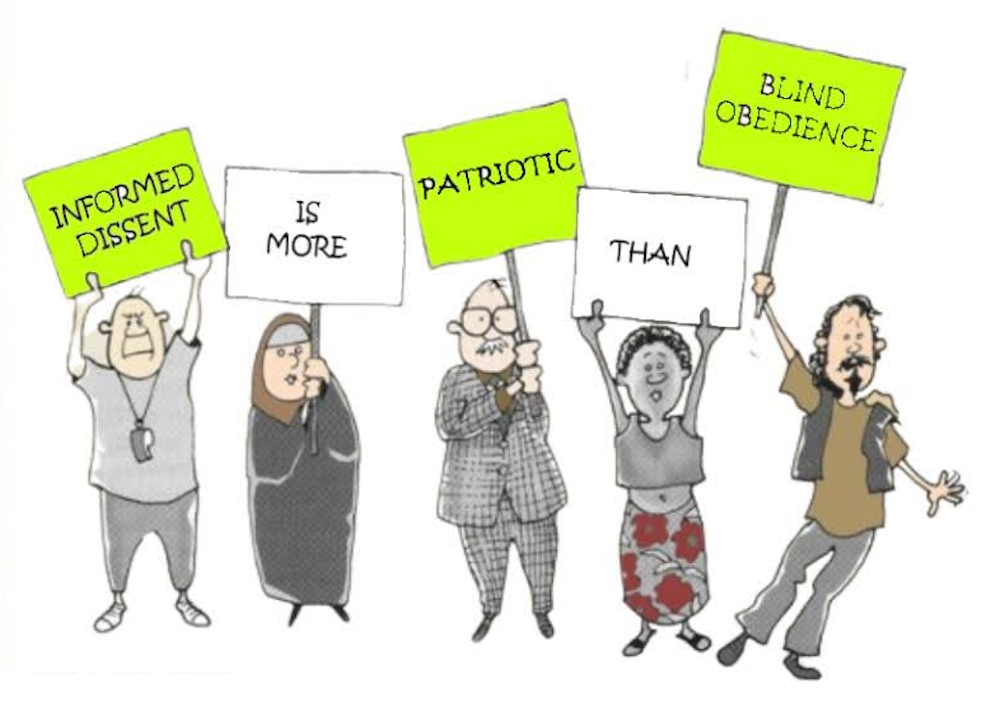


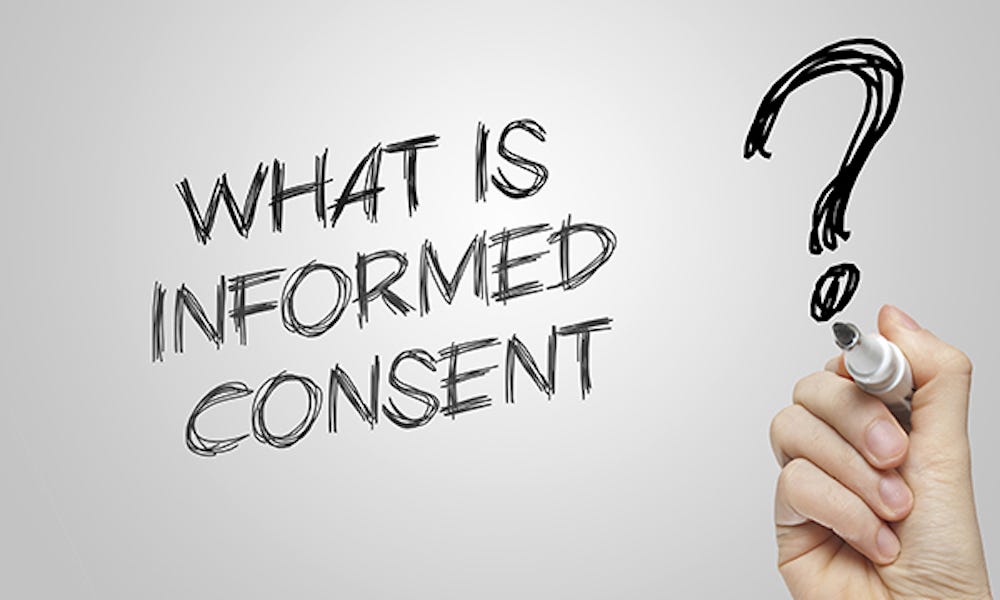
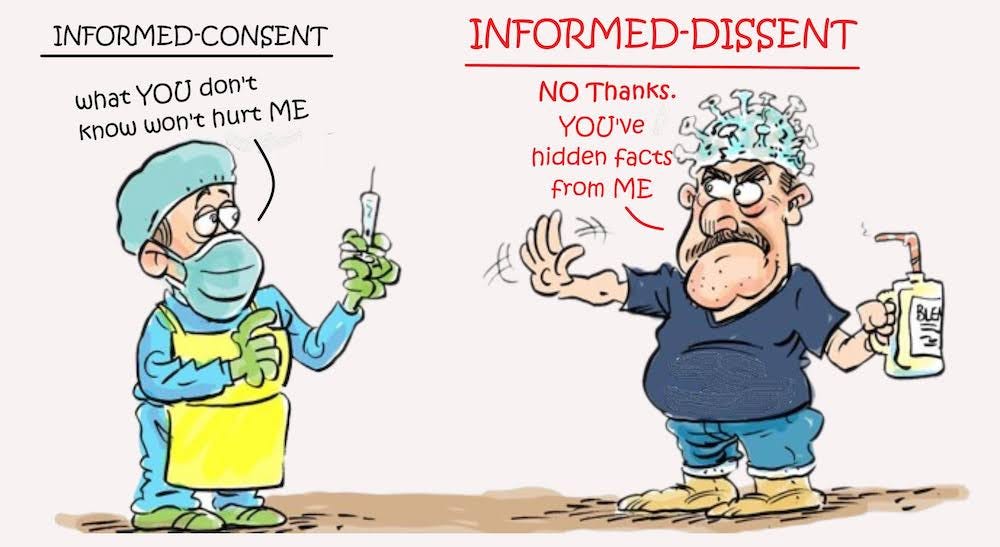

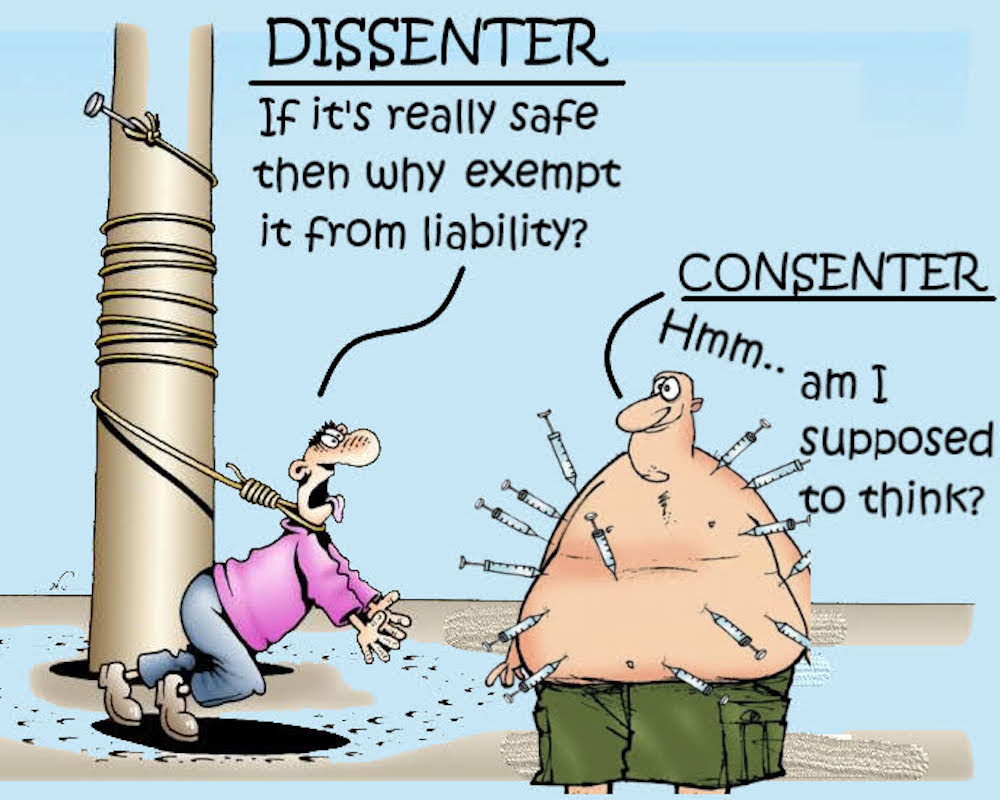

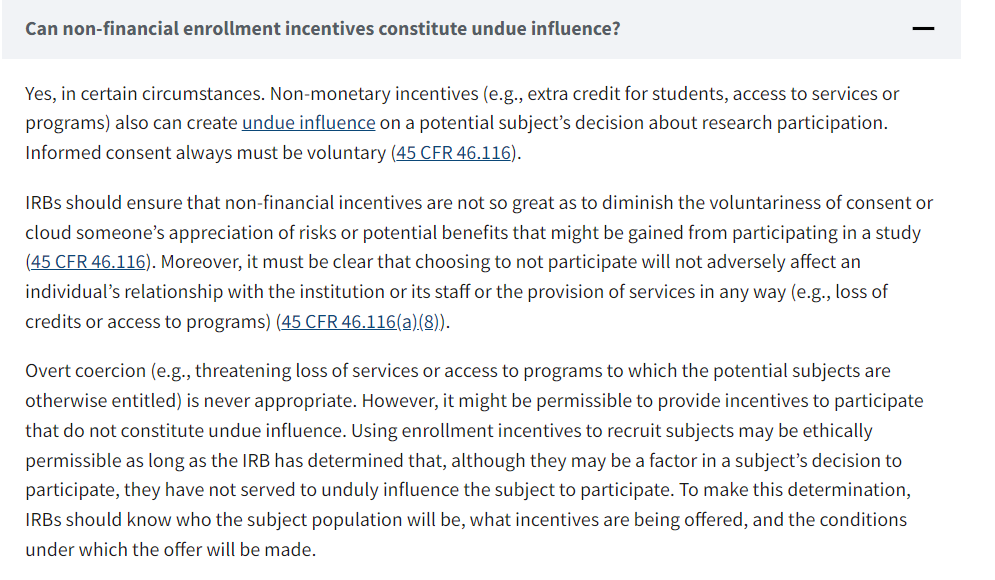



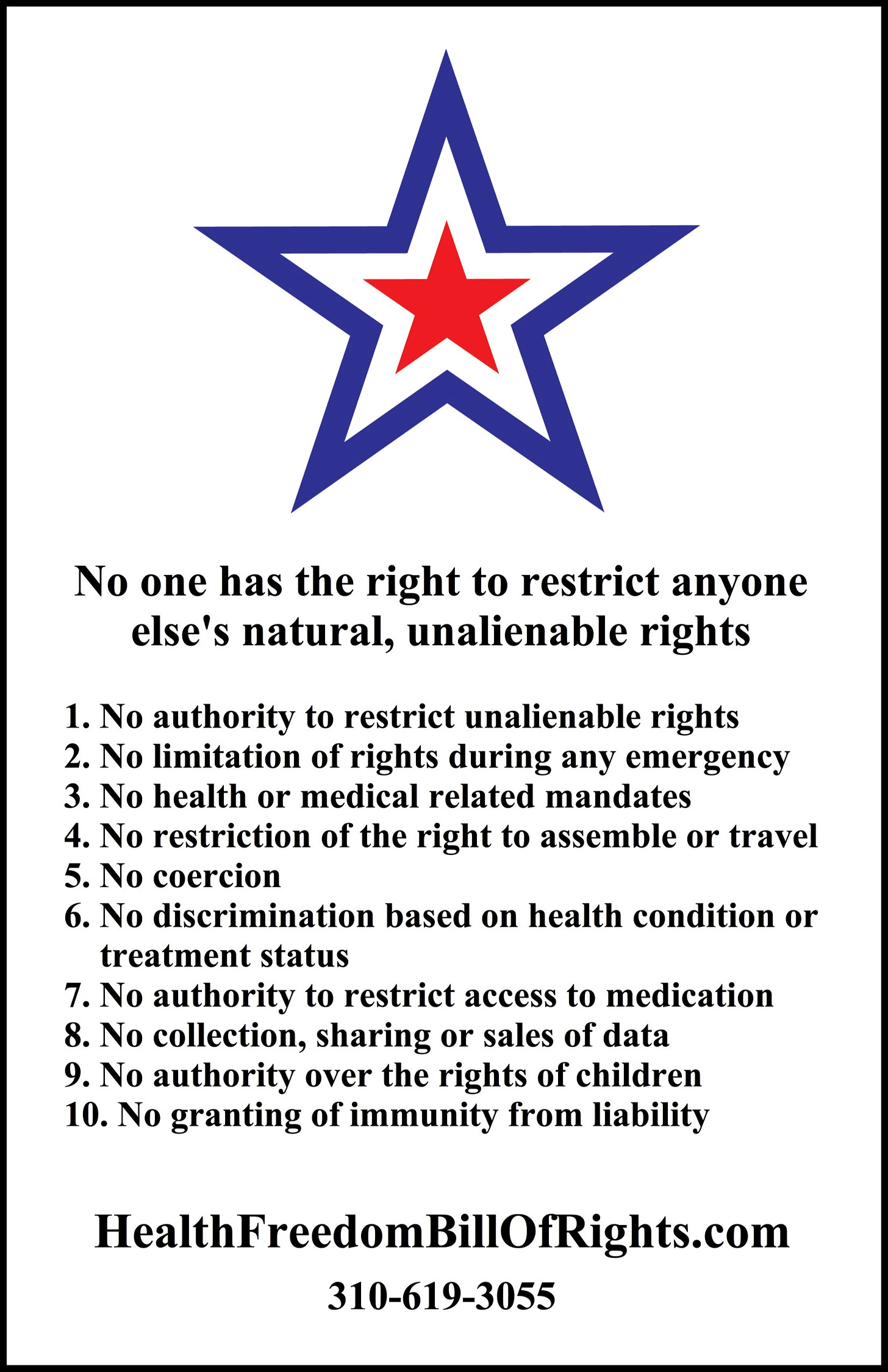

On a side note--Now the FDA has made it legal to not inform when there is supposedly low risk(how do they know?) about a drug trial. I guess that is so they can put vaccines in our food and big pharma will not be liable. "Who decides what constitutes “minimal risk”? Researchers and IRBs. This prevents human subjects from deciding for themselves whether to participate in research studies.
How can they know if a product has “minimal risk”? They cannot; It is disingenuously presumptuous to claim to know a pharmaceutical product or procedure comes with “minimal risk” prior to long-term outcomes determination. This rule obfuscates the detection and discovery of adverse events." https://popularrationalism.substack.com/p/the-defender-fda-makes-it-official SO WE NEED TO STOP THEM.
Notice of withdrawal of Consent did not work. Maybe this will. Worth a try.